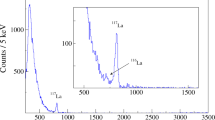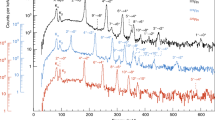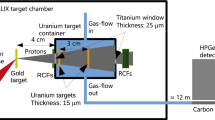Abstract
AT the Physical Society's Conference on Fundamental Particles, held at Cambridge in July 1946, we reported that a light charged particle is occasionally emitted in the fission of uranium by slow neutrons, in addition to the two heavy fragments. This was observed during an examination of fission fragment tracks produced in Ilford photographic emulsions by a method which we have previously described1. Similar observations have recently been reported by Tsien, Chastel, Ho and Vigneron2.
This is a preview of subscription content, access via your institution
Access options
Subscribe to this journal
Receive 51 print issues and online access
$199.00 per year
only $3.90 per issue
Buy this article
- Purchase on Springer Link
- Instant access to full article PDF
Prices may be subject to local taxes which are calculated during checkout
Similar content being viewed by others
References
Green and Livesey, Nature, 158, 272 (1946).
Tsien, Chastel, Ho and Vigneron, C.R. Acad. Sci. Paris, 223, 986 (1946).
Cassels, Dainty, Feather and Green, unpublished.
Author information
Authors and Affiliations
Rights and permissions
About this article
Cite this article
GREEN, L., LIVESEY, D. Emission of Light Charged Particles in the Fission of Uranium. Nature 159, 332–333 (1947). https://doi.org/10.1038/159332a0
Issue Date:
DOI: https://doi.org/10.1038/159332a0
This article is cited by
-
Light-charged particle emission in fission
Pramana (1989)
-
Two Cases of Triple Fission of Uranium-235
Nature (1959)
-
Die photographische Emulsion in der Kernphysik
Die Naturwissenschaften (1948)
-
Emission of Secondary Charged Particles in Fission
Nature (1947)
Comments
By submitting a comment you agree to abide by our Terms and Community Guidelines. If you find something abusive or that does not comply with our terms or guidelines please flag it as inappropriate.



